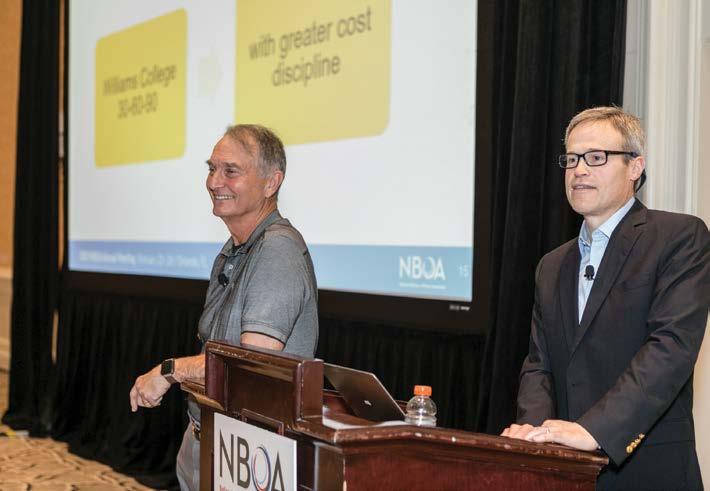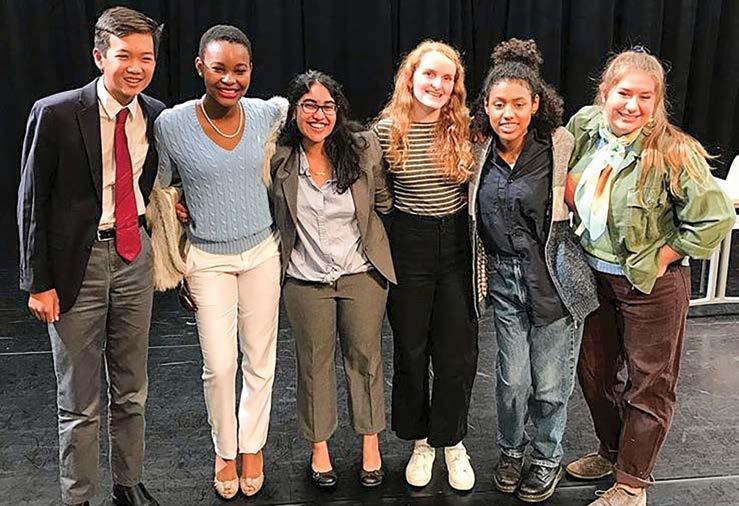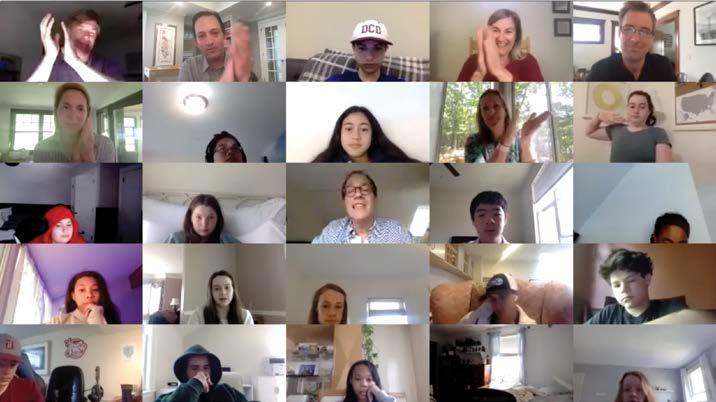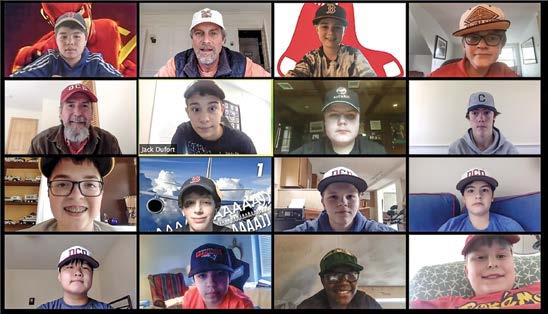
6 minute read
Andrew W. Kendall '74
Andrew W. Kendall ‘74
A Commitment to Developing Local Food Sources in the Face of a Global Pandemic
Advertisement
By Leslie Bowen
Fourth- and fifth-graders at DCD had an unusual

Andrew Kendall '74
visitor to their classrooms last year. Andrew (Andy) Kendall ’74, executive director of the Henry P. Kendall Foundation and former president of The Trustees of Reservations, arrived on campus with bags of lettuce to conduct a food experiment, having students try each kind in a blind taste test and give their opinion of which tasted better.
Thankfully, our students are well versed in lettuce varieties from the rotating selections offered at the salad bar each day at lunch, so they participated enthusiastically in the test! Remarkably, 100 percent of them chose the lettuce grown locally over the conventional bag lettuce from California.
“I hadn’t done it before, but it was a fun experience with them,” he said. “I asked them to describe it, touch it, taste it.”
Andy’s goal was to prove a point: lettuce grown locally tastes way better than lettuce grown three thousand miles away in California. In New England, where the growing season is short and the land expensive, most of the lettuce we consume comes from this source. “By the time you bring it home, you only have a few days to consume it, compared with greenhouse-grown hydroponic lettuce grown 25 miles away, which lasts three weeks instead of three days because it doesn’t have to travel three weeks across the country,” he explained.
He points out how the impact on the environment is lessened as well with this method of growing. “Lettuce grown inside uses a tenth of the water for irrigation, so there’s a much better use of water. Water comes off the roof from rain, so it’s a more sustainable product, and it tastes better. I can identify it anywhere in a restaurant. The conventional kind doesn’t stand up as well,” he said.
Food became the focus of the Kendall Foundation once Andy took over the leadership reigns from his uncle and father. Established in the 1950s by his father, John Kendall ’40, and his uncle, Dr. Henry Kendall, a physics professor at MIT and the Nobel Prize-winning founder of the Union of Concerned Scientists, the foundation always had an environmental orientation, with his uncle’s work advocating for sound science around the risks of nuclear power. The foundation later took up climate and energy and landscape and wildlife conservation. When his uncle passed away in 1999, Andy took a role on the board, and, in 2008, he took over the position of chair from his father. With this change in leadership, the foundation began to focus on food.
Though not intentional, Andy’s life path shows an interesting progression over the years involving food.
“I look back on various experiences jobs I’ve had since high school there is, in fact, a common thread of exposure to the food system. For example, during my senior year of high school, I lived and worked on a shrimp farm in Central America, one of the first of less than five agricultural enterprises at the time trying to grow shrimp. I went on from there to work at a seed manufacturing company right after college.”
During his 12 years as president of The Trustees of Reservations, he led the development of a network of community farms and gardens across Massachusetts dedicated to the sustainable production of local food, now the largest private farm landowner in the state. “During my time there, I saw the essential and powerful connection between the farms and the communities and the people they serve, which made a big impression on me.”
When he left the trustees, his relationship and roles around food became more intentional as he delved into philanthropic and investment work of the Foundation. “Now it’s full immersion in learning about a large, complicated system that spans the entire planet and connects to every person on it. It can be overwhelming at times but carving out a niche and deciding that this is the part we want to focus on, with faith that others are working on other parts of it, and the knowledge that collectively we can move in a more positive direction.”
In his role at the Foundation, Andy gets to see the big picture, connecting the dots of the food system by convening various stakeholders that might not otherwise come together and finding meaningful ways to support a more localized food system. Inspired by the rallying cry 55/60, he and others believe that New England is in a position to produce and consume more than 50 percent of its food by the year 2060. Right now, he said that number is about 10 percent and, in some cases, closer to 5 percent.
To promote this vision, Andy spends his days meeting with farmers and food activists and others in the food system. A good part of the foundation’s work is with colleges and universities. “Foodservice directors are the unsung heroes of the food chain. They’ve been incredible partners, buying and supporting local food, getting it on menus on campus, engaging with students, and changing food preferences.”
Recently, he spent a morning on a two-hour Zoom class at Montana University on sustainable food systems, listening to students’ ideas about how best to invest and distribute funds to the food system in New England during the pandemic, achieving an essential goal of the foundation “to enable young, enthusiastic, creative, innovative leaders to make their way into the complicated morass of the food system. “
The pandemic, in many ways, underscores the importance of a shorter, more localized food system, he says. “The shorter the supply chain, the better it performs in times like this. As a country, we’ve been lulled into a sense of security, that we can have any kind of food whenever we want it, that we can just go into the grocery store. Food is something we all depend on every day, and now all the fragile aspects of it have been exposed. All the relationships and supply-chain linkages have been broken. Everywhere you look, there’s the sad outcome of destroying food, throwing away food in one place while others are standing in line to get food.”
The Kendall Foundation had to adjust its strategy in March, suspending the remainder of its 2020 programs and refocusing its efforts and resources to minimize the negative impacts of the pandemic on the regional food system and respond where they can have the greatest impact. These include the following initial set of grants to stabilize the local food system and help food producers recover from the crisis:
• A $350,000 grant to the Boston Public Market to provide working capital and some immediate relief during the COVID- 19 crisis. Since opening in 2015, the Boston Public Market has connected more than ten million visitors to food products grown, harvested, and hand-crafted in New England.
• A $250,000 grant to the John Merck Fund, which, together with the 1772 Foundation and others, has established the New England Food System Resilience Fund, designed to reinforce, restore, and promote the resilience of the regional food system in a time of unprecedented disruption.
• A $150,000 grant to CommonWealth Kitchen to provide working capital and some immediate relief during the COVID-19 crisis. Since opening in 2014, CommonWealth Kitchen has helped launch more than 200 food businesses, employing almost 600 people, and generating more than $50 million in annual revenue.
• A $100,000 grant to Coastal Enterprises, Inc. to provide immediate debt relief to its portfolio of more than 40 farm loans. These funds will provide three months of debt relief to farms and help them address new market realities brought on by the pandemic.










